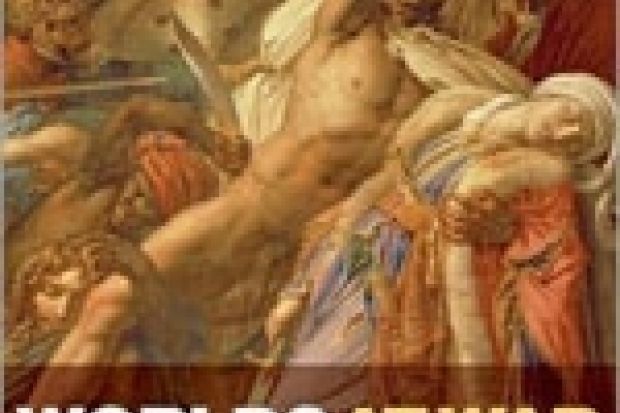The title of Anthony Pagden's Worlds at War: The 2,500-Year Struggle between East and West nods at Herodotus and H. G. Wells. Worlds at War lives up to Wells's half of Pagden's allusion, giving us countless wars of two "geographically unstable" worlds that were culturally at odds with one another even before the Athenian victory over the army of Persian king Darius at Marathon in 490BC.
However, the Greek, Persian, Roman, Christian, Judaic and Islamic gods, or God, or G-d, have not benevolently created any miraculous bacteria to keep the Western and Eastern worlds from proving again and again the point of Wells's classic myth The Island of Dr Moreau. Evolution, law, religion and science cannot bring human hearts out of the darkness.
As Freud observed two decades later during the abominable carnage of the First World War, "the history of mankind is the history of murder". The East-West component of the Great War gave rise to a reconfiguration of the Middle East, based ultimately, as Pagden explains, on reasoning that was "a farrago of nonsense". It has been the locus of hateful killing right up to the current Iraq War. Try as we might in the East and West to put an end to violence - and Pagden shows that there are long periods when we hardly try at all - in Dr Moreau's words, "the beast begins to creep back, begins to assert itself again".
Worlds at War has the grand scale and self-confident sprawl of Herodotus's history. Pagden shares the father of history's humane sensibilities, judicious use of illuminating anecdotes and story-telling powers. His accounts of Byron's and T. E. Lawrence's vainglorious and self-mythologising exploits on behalf of Greek and Arab independence are digressions worth every word in them.
At the outset, Pagden makes the case for a perpetual enmity between the Greeks and Persians from before the Persian Wars through the campaigns of Alexander the Great. He even uses the term "hatred".
"Hatred" and "enmity" seem too strong for the complex Greek-Persian relations of the 5th and first half of the 4th centuries BC. Herodotus writes respectfully about the epic deeds performed by both the Persians and Greeks and how they came into armed conflict (polemos). Hatred does not come into it.
The immediate cause of the First Persian War was the Ionian revolt, instigated only after Aristagoras, tyrant of Miletus, collaborated with the Persian satrap of Lydia Artaphrenes in a failed attempt to conquer the Greek island of Naxos. Fearing from the Persian king the kind of punishment - beheading - that Sultan Mehmed IV dealt to Kara Mustafa Pasha for his defeat at Vienna in 1683, Aristagoras suddenly championed the Ionian Greek cause. And in 490BC the Persians were trying to reinstall the deposed Peisistratid, Hippias, as tyrant of Athens. Even the Greek expedition against Troy was presented in the central Greek cultural myth, Homer's Iliad, as a personal vendetta of Agamemnon and Menelaus against the Trojan prince Paris, with lots and lots of collateral damage.
In all 12 of Pagden's chronological periods, antipathy or unease with "otherness" has to be whipped up into hatred, and it is often one-sided. This applies even to the Islamic "East", despite its standing principle of jihad.
So it is even with the Roman Empire, which Pagden views favourably for embodying a universal concept of civitas ("citizenship") and, like the Greeks, keeping religion and state power separate. Nonetheless, Brutus and his fellow conspirators used Julius Caesar's "Eastern" royal pretensions as a motive to assassinate him. And Octavian/Augustus demonised Antony as Asiatic in order to justify waging civil war against him.
These mythic associations have long afterlives. Octavian's naval victory at Actium was culturally and politically mythologised as a second battle of Salamis, the sea battle that all but ended the Second Persian War in 480BC. The European victory in October 1571 over the Ottoman fleet at Lepanto, not far from Actium, was hailed as a third Salamis.
Over the 2,500 years Pagden covers, there are personal relationships, of individuals and groups, across the East-West boundaries. There are also periods of mutual understanding, disinterested laissez-faire, and something like detente, if not harmonious coexistence. These are undone by human ignorance, individual and collective lust for power, for example Aristagoras and Hippias, religious zealotry, economic ambitions, fear and suspicion.
Ironies are frequent and Pagden lets them speak for themselves. When Pope Urban II incited "a collection of maniacs, mountebanks, and desperadoes", and religious fanatics to go forth as milites Christi ("soldiers of Christ") on the First Crusade, he was reversing Christ's radical message of "turning the other cheek" to one's enemies. Urban's perverse jihad was aimed not at conversion or conquest of non-believers, but at repossessing lands that the Church considered part of the Christian world. There was a Christian witness to the slaughter of Muslims and Jews inside Jerusalem at the end of the Crusade's long murderous trail: "No one has ever seen or heard of such a slaughter of pagans, for they were burned on pyres like pyramids and no one save God knows how many there were."
Yet not long afterwards in the Latin Christian kingdom planted by the First Crusade, the Knights Templar offered a Muslim Syrian aristocrat visiting Jerusalem space to pray in the former al-Aqsa mosque and apologised when a recently arrived Frank, lacking cosmopolitan understanding, disturbed him in his prayers.
Pagden views religion as a villainous force in his history: "The myths perpetrated by all monotheistic religions - all religions indeed - have caused more lasting harm to the human race than any other single set of beliefs." Readers of Worlds at War will find it difficult to disagree.
Accordingly, he argues that the separation of Church and State in the "West" from the Greeks onward (and fortunately embodied in the message of Mark 12:13-17: "Render unto Caesar ...") is responsible for its having the upper hand now over the "East"; and his concern over US President George W. Bush's many God-directed actions is tempered by the fact that "so far enlightenment values have been able to survive because the power of religious institutions and religious laws have been kept firmly in their place on the far side of the dividing line between politics and religion".
So far.
THE AUTHOR
Anthony Pagden has led a cosmopolitan life: he was born in Britain, raised in Chile, and has lived, studied and worked in Spain, Cyprus, France, Italy and the US.
He studied for his first degree at Barcelona University but abandoned his studies and fled the country during the Franco regime. He worked in Paris for a year before travelling to Cyprus with the intention of translating Hernan Cortes's Letters from Mexico.
It was in Cyprus that Pagden became interested in the Islamic world, resulting in a horse ride across Kurdistan inspired by the travels of Lord Curzon, followed by a return to university, this time Oxford.
Pagden settled into what he calls a "relatively conventional academic career" at Oxford, the Warburg Institute in London, Princeton, Cambridge, Johns Hopkins and his current position as distinguished professor of political science and history at the University of California, Los Angeles.
His devotion to his work leaves little time for other activities, and he readily admits that he has no hobbies. "But I do like fast cars!" he says.
Worlds at War: The 2,500-Year Struggle between East and West
By Anthony Pagden
Oxford University Press
576pp
£20.00
ISBN 9780199237432
Published 13 March 2008




